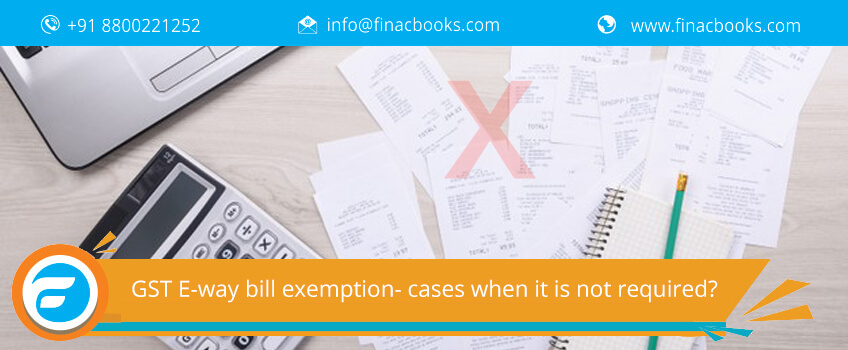GST was introduced by the Government of India to make the taxation process transparent. The implementation of GST has served the purpose of making the process quick and clear. The GST has made it important for transporters to carry e-bill when moving goods under certain conditions.

What documents to carry in case eway bill is not required?
An eway bill will be an effective instrument for detecting and tracking tax evasion at numerous stages along the supply chain. When an eway bill is not necessary, the transporter must ensure that a copy of the tax invoice or bill of supply is carried.
An example demonstrates how the e way bill functions as a tax evasion tool. If raw materials are carried from Karnataka to Tamil Nadu, where they are processed and sold, the state to which they should be paid is Tamil Nadu, as it is the state of consumption. If, on the other hand, half of the finished goods are transported to another state, say Kerala, and then sold there, Kerala retains the revenue share. This is when the electronic way bill comes in handy. It enables us to gain a thorough understanding of the movement of goods inside each state, thereby assisting in the prevention of tax evasion. As a result, the eway bill is a critical document that facilitates the movement of goods between places.
Prior to the commencement of the movement of goods, the taxpayer/transporter must prepare an eway bill. An eway bill can be prepared electronically by uploading relevant information, such as the type of goods, the HSN code, the quantity and taxable value, the recipient's details, the transporter's details, and the vehicle's identification number. As a result, it goes without saying that if a taxpayer is subject to mandatory provisions, the items should always be covered by an eway bill. If not, he is needed to carry a copy of a tax invoice or other valid document as defined in the goods and services tax laws' invoicing provisions.
Specific transactions that do not require the use of an e way bill generation
Though the e way bill generation is important, still there are cases when the e way bill is not required. The following cases are mentioned below –
1) The e way bill is optional for goods having value lower than Rs.50000 (except in cases of mandatory e way bills provisions like the movement of Handicraft goods and movement of goods for Interstate Job work)
2) If goods are transported by a non-motorized mode of transport (Ex. Horse carts or manual carts)
3) If goods are being transported -
a) From the port, airport, air cargo complex, and land customs station to an inland container depot (ICD) or a container freight station (CFS) for clearance by customs.
b) Under customs bond, from one customs port/station to another
c) Under customs bond, from an ICD or CFS to a customs port, airport air cargo facility.
d) Transport of goods inside the notified area
e) Goods moved under customs surveillance or with a customs seal
f) The goods are in transit from/to Nepal/Bhutan.
g) If goods are transported within 20 kilometres of a weighbridge and then returned to the place of business covered by a Delivery Ticket (DC)
i) Transport of goods to and from the Ministry of Defense
j) Where the government or local authorities transports goods by rail in their capacity as a consignor.
Thus, if a taxpayer falls under one of the following categories, he will be exempt from the requirement to generate an e way bill. While taxpayers who qualify for e way bill exemptions are excluded from this requirement, they should verify that other papers such as the invoice and bill of supply comply with applicable rules and regulations. A taxpayer who violates the e way bill laws faces serious penalties.
Specific goods exempted from the e way bill
1) Transportation of the goods stated in the annexure to the rules as follows:
a) Liquefied petroleum gas for supply to residential and non-domestic exempted consumers
b) Kerosene oil distributed through the Public Distribution System (PDS)
c) Postal baggage transported by the Postal Service.
d) Natural or cultured pearls and precious or semi-precious stones; precious metals and clad with precious metal.
e) Jewellery, goldsmiths' and silversmiths' products, and related items
f) Currency
g) Used Personal and household effects
h) Worked and unworked coral
2) Transported goods include alcoholic beverages for human consumption petroleum crude high-speed diesel, petrol, natural gas, and aviation turbine fuel.
3) Goods transported by the empty cargo containers
4) Transported goods that are not considered supplies under Schedule III of the Act. Schedule III includes actions that are neither a supply of goods nor a service, such as an employee's service to an employer in the course of his job, and functions performed by a Member of Parliament or a Member of the Legislative Assembly.
5) Goods shipped other than de-oiled cake is defined in Notification No. 2/2017–Central Tax (Rate) dated 28th June 2017. Several of the goods listed in the above notification include the following:
a) Buttermilk, curd, and lassi
b) Fresh milk and pasteurised milk that is not sweetened with sugar or other sweeteners
c) Fruits
d) Vegetables
e) Animals, plants, and trees that are alive
f) Tea leaves that have not been processed and unroasted coffee beans
g) Salt
h) Meat
i) Rice and wheat flours that are not branded
j) Cereals
j) Educationally important items (books, maps, periodicals)
6) Exempted goods under Notification No. 7/2017–Central Tax (Rate) dated 28th June 2017 (supply by CSD to unit-run canteens and authorized customers) and Notification No. 26/2017–Central Tax (Rate) dated 21st September 2017 (consists of heavy water and nuclear fuels).











